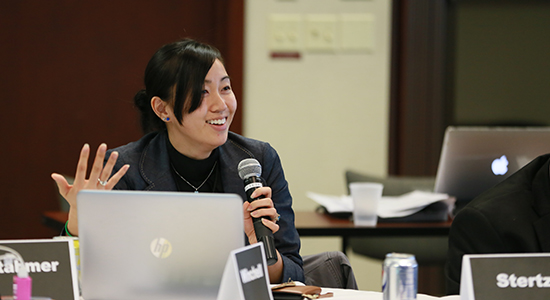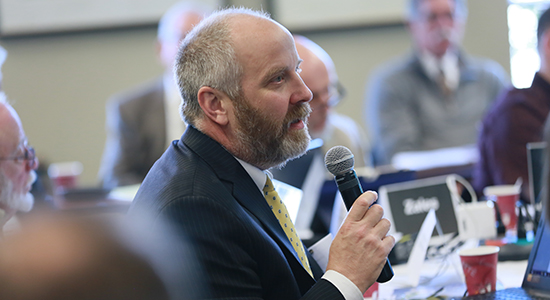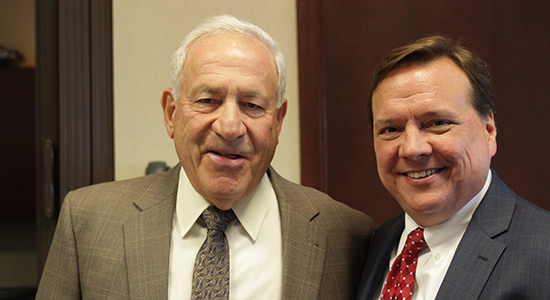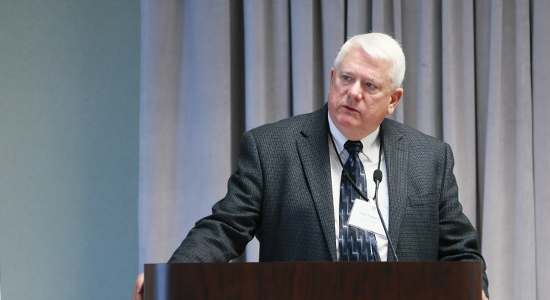April 21, 2017 – State Bar of Wisconsin President Fran Deisinger opened today's Board of Governors' meeting with a moment of silence in memory of attorney Sara Quirt Sann, one of four people killed in the Wausau area March 22 by the estranged husband of her client.
During the meeting at the State Bar Center in Madison, the board voted to support a forthcoming petition to increase to $100 the hourly rate paid to private bar attorneys who take appointments from the State Public Defender's Office.
Dist. 2 Gov. John Birdsall said the State Public Defender (SPD) appoints nearly 40 percent of its cases to the private bar based on conflicts that preclude staff representation. Private attorneys who take SPD appointments receive $40 per hour, which is the lowest rate in the country.
The Wisconsin Legislature sets the SPD private bar rate under Wis. Stat. section 977.08. The rate has remained largely unchanged since 1978 when the SPD was established. At that time, the Legislature set the SPD private bar rate at $35 per hour.
Petitioners assert that Wisconsin is now facing a “constitutional crisis” because fewer and fewer experienced attorneys are willing to take SPD appointments at $40 per hour, a compensation rate that fails, in many cases, to cover overhead expenses.
Thus, many criminal defendants in Wisconsin may not receive the effective legal representation that is required by the Sixth Amendment to the U.S. Constitution.
The petitioners – including the Wisconsin Association of Criminal Defense Lawyers, former and current district attorneys, several former State Bar presidents, law professors from both law schools, a former Wisconsin attorney general, and other high-profile lawyers in Wisconsin – say the time has come for the Wisconsin Supreme Court to intervene on an issue that the Wisconsin Legislature has failed to address.
“The court itself has stated that there is a direct connection to the effectiveness of appointed counsel and the rate paid,” said Birdsall, one of the attorneys who filed the petition on behalf of petitioners. “The legislative and executive branches have failed to act through both neglect and active indifference."
“The co-equal branch of government, the Supreme Court of Wisconsin, has the exclusive responsibility to ensure compliance with the Gideon v. Wainwright mandate to supply poor people with effective lawyers,” Birdsall said.
“It is incumbent on that branch to stop the free fall into the abyss of a constitutional crisis that we are currently headed toward. As more lawyers leave the area of indigent defense, we will soon be unable to meet that mandate. We need only look at Louisiana’s current crisis to see our immediate future.”

NRLD representative Viet-Hanh Song-Thi Nguyen Winchell comments on the budget proposal.
Constitutional Crisis
About six years ago, the Wisconsin Supreme Court rejected a similar petition that sought to raise the private bar rate to $80, noting that adopting it would “constitute a challenge to the compensation rate set by the legislature in Wis. Stat section 977.08.”
The court, in its final order, recognized the area as one of shared authority for the court and the legislature, but said: “[W]e decline at this time to use our administrative regulatory process to effectively circumvent a legislative enactment.”
But the court also noted: “If this funding crisis is not addressed we risk a constitutional crisis that could compromise the integrity of our justice system.” Petitioners now say that constitutional crisis is here and provide empirical evidence to support the claim.
The petition, likely to be filed in early May, would increase the rate that attorneys receive for direct court appointments, under Wisconsin Supreme Court Rule (SCR) 81.02, from $40 to $100, starting in 2018 with annual increases tied to the Consumer Price Index.
It would also ban contracts for the provision of court-appointed legal services at a lesser rate than $100, and declare that an hourly rate less than the rate set by SCR 81.02 for legal services rendered pursuant to appointment by the SPD is unreasonable.
Since the legislature has failed to address the SPD private bar rate, despite repeated requests to do so in the last 10 years, the petitioners call on the Wisconsin Supreme Court to address the issue, noting its “shared authority” in this area and its inherent authority to ensure the effective administration of justice in Wisconsin.
“The Court should not fear that adopting a court rule increasing pay will necessarily result in forcing the legislature to expend more money,” petitioners wrote. “The Wisconsin legislature can, for instance, find other ways to offset the increased costs required to fulfill the constitutional command of access to competent, conflict-free counsel.”
President Deisinger urged governors to support the petition, saying that the issue is both vexing and complex. “The rate private attorneys are getting in this state is scandalous. Read our vision statement: ‘Our members are the respected guardians of the dignity and integrity of the rule of law within a fair and accessible justice system.’ This is a core issue. It’s who we are.”

Adam Gerol comments on the petition to amend SCR Chapter 81 on the hourly rate for court-appointed attorneys.
Board Approves Voluntary Paralegal Certification Program
The board unanimously approved the creation of a voluntary certification program for Wisconsin paralegals that will be administered by the State Bar’s Continuing Legal Education Committee, with assistance from the Professional Development Department.
The program will require paralegals seeking State Bar certification to successfully complete an approved paralegal studies program with Wisconsin-specific substantive content and skills training, complete 10 hours of continuing paralegal education every two years, and demonstrate good character. State Bar-certified paralegals, required to work under attorney supervision, would be subject to ethical rules and obligations.
Kathryn Bullon, past chair of the CLE Committee that originally proposed the certification program in 2015, previously noted that a certification program would help attorneys add value to their practices with highly trained paralegals and would help protect the public from the incompetent or unauthorized practice of law.
Other state bars certify paralegals, including Florida, North Carolina, Ohio, and Texas, which allows them to actively shape how paralegals are regulated, Bullon noted.
The State Bar of Wisconsin filed a petition to the Wisconsin Supreme Court in 2004 that would have created a court-administered regulatory structure for paralegals. The court declined to create one, but invited the State Bar to consider a voluntary program.
In 2016, the board approved the concept of a voluntary paralegal certification program but charged a working group to explore program details, including administrative and fiscal impacts. The program is projected to generate a modest profit through year five.
The Paralegal Association of Wisconsin supports a voluntary State Bar certification program for paralegals, which would promote professionalism, training, and education.

State Bar presidential candidates, Jon Axelrod and Chris Rogers.
Board Approves FY 2018 Budget
The board approved an $11.7 million budget for fiscal year 2018 (July 1, 2017 to June 30, 2018), which includes a modest dues increase of $4. Membership dues, which will increase to $258 for full dues-paying active members, fund approximately 45 percent of the State Bar’s budget.
The State Bar slightly reduced staffing and took other cost containment measures through an annual budgeting process that reviews each program to determine if it is meeting members’ needs and expectations. The process also reviews if the Bar is reasonably and effectively funding the delivery of those programs.
For the first time in history, the State Bar expects a decline of 244 full dues-paying members for 2018, noted State Bar Treasurer John Danner, a member of the board’s Finance Committee. Fewer law school graduates and a greater number of those eligible for and claiming emeritus status are driving the decrease in membership.
Attrition, demographic changes, and changing consumer preferences for educational products also contributed to a flat revenue trend for CLE offerings. With minimal revenue growth, inflation added additional challenges, State Bar Finance Director Paul Marshall noted.
The State Bar’s Finance Committee determined that a $4 dues increase was both warranted and necessary only after expense cuts of $574,000, and the strategic use of reserve funds and other revenue sources. Wisconsin’s dues rate is still the second lowest compared with other Midwestern states: Michigan ($180), Minnesota ($260), Iowa ($260), Indiana ($298), Illinois ($360), and Ohio ($305).
Membership dues are separate from mandatory Wisconsin Supreme Court assessments, which the State Bar collects through yearly dues statements. The State Bar last increased dues in 2015, after a decade in which dues remained unchanged.
Governor Nick Zales moved to reinstate 100 percent reimbursement for volunteer travel, as the Finance Committee had proposed reimbursement at 75 percent as a budget-cutting measure. The additional $25,182 for this reinstatement will come from the Dues Stabilization Reserve. This motion passed and will be reflected in the final budget for FY 2018.
Public member James Wenzler moved to amend the proposed budget to remove the dues increase; the motion was defeated 30-12 by roll call vote. During discussion, Danner pointed out that, in 13 years, dues increased a total of $34 – a rate less than inflation.
Deisinger, during the discussion, said he supports the $4 increase. “I hate the idea of having a dues increase, but I feel obligated to be fiscally responsible,” he said.
In the end, the board moved to approve the proposed FY 2018 budget, with a $4 dues increase and amended to include 100 percent reimbursement for volunteer mileage.

State Bar Treasurer John Danner at the podium during the budget discussion.
Board Approves Bylaws Changes, Supports Supreme Court Rule Changes
The board unanimously adopted changes to the State Bar’s bylaws, which have not been updated in more than 10 years. The board also supported amendments to provisions in Chapter 10 of the Wisconsin Supreme Court Rules, which governs the regulation of the State Bar.
The board’s Governance Committee recommended the changes, which require approval from the Wisconsin Supreme Court. The overall goal is to give the State Bar increased flexibility in determining its optimal governance.
For instance, the proposed changes would remove from SCR Chapter 10 references to individual officers and the Board of Governors that set forth responsibilities currently delegated to the State Bar and its staff.
The proposal places day-to-day operational duties and obligations of State Bar officers, committees, sections, and divisions in the State Bar bylaws, rather than SCR Chapter 10; and makes changes to the State Bar bylaws referendum and amendment procedures.
Other Business
-
The board unanimously voted to update the State Bar’s “White Book,” a compilation of State Bar policy positions, to reflect a statement on diversity that the board adopted in 2012.
-
The board approved the Intellectual Property & Technology Law Section’s request to amend its bylaws, and approved various section requests to carry forward more than $10,000 in operating budgets to 2018.
-
The board approved the appointment of former State Bar President Diane Diel to a three-year term on the Access to Justice Commission.
Upon request, interested members may obtain a copy of the minutes of each meeting of the Board of Governors. For more information, contact State Bar Executive Coordinator Jan Marks by email or by phone at (608) 250-6106.
